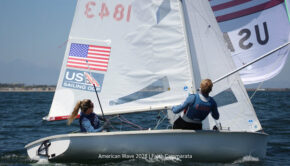Rio Olympics: Focus on the Problem, Not on the Sailors
Published on September 10th, 2015
While it is no longer news that the quality of water for the sailors will be poor at the 2016 Olympic Games, it is less often stated that local efforts to eradicate pollution are leveraging the Olympics to improve a long-standing situation. While the cry to protect the athletes resonates well in headlines, this story in insidethegames reports how some sailors are tired of getting used…
Brazilian politicians and businessmen charged with cleaning Rio’s Guanabara Bay should be held to account for how they have used their resources, and should be blamed for problems rather than sporting authorities, the head of one of the world’s most successful sailing teams has said.
The build-up to next year’s Olympic and Paralympic regattas to be held in the Marina de Gloria on the Bay has been dominated by criticism of high levels of pollution, despite a vow to use the Games as a catalyst to clean the water being a key part of Rio’s successful bid in 2009.
Some have criticised Rio organisers, as well as the International Olympic Committee (IOC) and International Sailing Federation (ISAF), for neglecting the safety of athletes by not moving the venue to another location outside the Bay.
But Stephen Park, team manager of the British sailing squad, has said journalists should focus not on the sports world, but on those specifically responsible for the clean-up operation, which was meant to involve the whole Bay rather than just the area reserved for sailing.
“I think the Brazilian press have been loathe to hold to account the politicians and businessmen that have been very specifically responsible for the billions of reals which have been allegedly spent on improving water quality,” he told insidethegames at an event marking the selection of the first eight British sailors for Rio 2016.
“Where’s the money gone? If that was in Britain or Europe, I suspect the media would have a lot less sympathy for those businessmen and politicians. They’d be ripping right into them and camping outside their doors, asking: ‘Who’s doing what, who’s responsible, how much did it cost and what exactly have they done?’
“They seem more keen on asking the athletes about the quality and getting a quote about how poor it is. Everyone knows it’s poor, but what are they doing about it?”
When bidding against Tokyo, Madrid and Chicago in 2009, Rio vowed to use the Games to reduce pollution levels by 80 per cent.
The State Government responsible for this work claim now that it has been 50 per cent improved, and will be up to 60 per cent by the time of the Games. Others believe there has been no improvement and that, if anything, the situation has got worse.
As well as the possibility of sailors contracting viruses during the Games, rubbish impeding the path of the boats is a problem, with one of the courses even having to be closed during the test event for this reason.
Collection boats have been organised to collect this rubbish, although the operation was suspended until July.
Park drew a comparison with preparations for the Beijing 2008 regatta in Qingdao, where there were problems with weeds in the build-up but the Chinese successfully eradicated the problem.
However, he is confident that adequate safety measures are being taken by his team to avoid problems in Rio, with the team being “diligent about hygiene” and working to improve gut health.
“We didn’t have any significant illnesses this time around [after the test event],” he added to insidethegames.
“We have had people ill in Rio before and clearly the water quality is not what any of us would like, but we have to recognise that it’s a developing naton and things aren’t always what we would like.
“I think it could be cleaner, but there’s a lot of mitigating actions we could take and that is exactly what we’re doing.
“We’re not interested in the scaremongering approach, Rio’s not the first or last place where water quality is poor.
“It’s the nature of the sport.”
Editor’s note: What is not mentioned in this story was that prior to the 2008 Olympics in Qingdao, the end of a sewage pipe was discovered breaking the surface on the race course. There were illnesses at that Games, but with the control China has over the media, we didn’t hear much about it.









 We’ll keep your information safe.
We’ll keep your information safe.